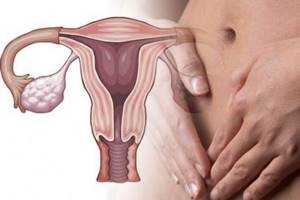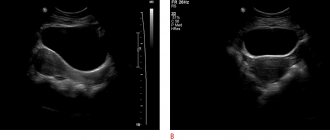Ectopic pregnancy is a dangerous gynecological pathology during which a fertilized egg is implanted outside the uterus. In 95% of cases, engraftment of the fertilized egg occurs in the fallopian tube. Much less often, the egg attaches to the ovary, abdominal organs, and cervix. If the pathology is not diagnosed and eliminated in a timely manner, severe, sometimes life-threatening consequences for the woman develop. Therefore, it is important to know what the early signs of ectopic pregnancy are before a missed period and what symptoms should be a reason to immediately seek medical help. Correcting the pathology in a timely manner will help preserve women’s reproductive health and prevent serious consequences.
What are the signs of an ectopic pregnancy before the delay?
In an ectopic pregnancy, an embryo implanted outside the uterus is in any case not viable. Immediately after fertilization and the implantation of the egg outside the uterus, the woman is not bothered by any suspicious symptoms. Before a delay in menstruation, a pregnant woman may not even be aware of her situation, leading her usual lifestyle.
3–4 weeks after implantation, the embryo continues to actively grow and develop. It gradually increases in size, stretching the walls of the fallopian tube, as a result of which the woman begins to feel the first symptoms of an ectopic pregnancy before her period is missed. The following signs should alert you:
- sharp pains and cramps in the lower abdomen;
- causeless nausea, bouts of vomiting;
- severe weakness, loss of performance, frequent dizziness;
- pain in the lumbar region, perineum and rectum;
- spotting bloody discharge;
- low-grade fever;
- difficulty urinating, diarrhea.
But sometimes these symptoms may appear later - at 5 - 6 weeks. Therefore, immediately after a delay, a woman should visit a gynecologist, undergo all the necessary tests, and then regularly visit a specialist to monitor the course of pregnancy and identify an anomaly at the earliest stages.
How to choose an ultrasound to determine pregnancy
The timing at which pregnancy can be diagnosed largely depends on the type of ultrasound. When carrying a baby, two types of scanning can be used - internal (transvaginal) and external (transabdominal).
Transvaginal is usually used in the first trimester, 4-9 weeks. At this time, internal ultrasound is the most informative, since during the examination the sensor is as close as possible to the uterus. A transvaginal examination can see the baby already on the 5-10th day of the delay, starting from the 4th week. The diameter of the fertilized egg at this time is only 2-4 mm.
Transabdominal ultrasound - through the outer wall of the abdomen - is preferably done at a later date. In the first trimester, it will show the embryo in the patient’s uterus only on the 21-22nd day after the delay, from the 6-7th week. The diameter of the fertilized egg with the embryo inside at this stage is 5-7 mm.
Classification of ectopic pregnancy
Depending on where the fertilized egg was implanted, the following types of ectopic pregnancy are distinguished:
- Pipe. Diagnosed in most cases. Implantation of the zygote occurs in the cavity of the fallopian tube. Often, with such a pregnancy, a miscarriage occurs in the first weeks, and if this does not happen, the fallopian tube ruptures.
- Abdominal. A fertilized egg is implanted on any organ located in the abdominal cavity. With this type of ectopic pregnancy, the woman is bothered by acute pain in the lower abdomen, problems with urination, bowel movements, nausea, and vomiting.
- Ovarian. Implantation and development of the embryo occurs in the ovary. This type of pathology is mainly found in women who have given birth multiple times and have reached the age of forty.
- Cervical. Implantation of the fertilized egg occurs below the internal uterine opening. This type of ectopic pregnancy is often accompanied by dangerous consequences - uncontrolled bleeding, which, if medical care is not provided in a timely manner, can cause the woman’s death.
If episodes of ectopic pregnancy occur repeatedly, the risk of recurrence is more than 15% and increases with its subsequent occurrence.
Blood test for hCG
Human chorionic gonadotropin (hCG) is a hormone that is usually found only in the blood of a woman who is pregnant. Therefore, it is often called the “pregnancy hormone”. Its content in the blood can become reliable evidence that a woman is expecting a child. The hCG test is becoming one of the most accurate methods for diagnosing pregnancy.
Positive test results (more than one unit) are practically reliable evidence that the woman is pregnant. This method has a number of advantages that set it apart from all others.
- Testing is inexpensive;
- Such diagnostics are almost never wrong;
- With the help of a blood test, you can find out about pregnancy even earlier than on the tenth day;
- By the excess of the hormone in the blood, it can be determined that a woman will have twins;
- By the lack of the hormone, you can understand that pregnancy will have complications;
- Taking the test does not harm the fetus in any way.
At what stage can an ectopic pregnancy be detected?
Signs of an ectopic pregnancy before a missed period are mild or completely absent. The pathology is most often diagnosed after a miscarriage in the first weeks. If this does not happen, the embryo, which increases in size, will stretch the tissue of the tube, ovary or cervix, causing pathological symptoms.
In case of further development of pregnancy, its abnormal course can be suspected at a period of 21–28 weeks. To do this, you need to be tested for the hCG hormone and undergo an ultrasound examination. During an ectopic pregnancy, the level of human chorionic gonadotropin is always below the levels characteristic of a certain stage of pregnancy. An ultrasound will show no signs of intrauterine pregnancy.
Early symptoms of ectopic pregnancy
If a woman has a stable menstrual cycle, then immediately after a missed period she will suspect she is pregnant. However, independently determining its abnormal course in the very first weeks is problematic, because often the pathology is no different from normal pregnancy and proceeds without suspicious symptoms until a certain period.
But already at 3–4 weeks, based on certain signs, a woman will be able to understand that something is wrong with her body. Early manifestations of ectopic pregnancy:
- mild to moderate pain, abdominal cramps;
- spotting bloody discharge;
- causeless nausea, bouts of vomiting;
- enlarged and painful breasts;
- disturbance of urination and defecation.
The pregnancy test shows a positive result, but the other line will be fuzzy and barely noticeable. This is due to the fact that the level of hCG in ectopic localization is significantly lower than in normal pregnancy. This sign should alert a woman and become a reason to make an appointment with a gynecologist as soon as possible.
When a fallopian tube rupture occurs, its signs
Fallopian tube rupture usually occurs between 6 and 10 weeks of pregnancy. As a rule, the clinical picture of the pathology begins with a sudden sharp pain in the abdomen, which radiates to the perineum and lower back. The main cause of such pain is internal bleeding and irritation of the abdominal wall by fluid accumulating in its cavity. Other symptoms of a ruptured fallopian tube:
- weakness;
- cold sweat;
- pallor of the mucous membrane and skin;
- decreased blood pressure;
- acceleration of heart rate;
- diarrhea;
- urinary retention;
- loss of consciousness.
On palpation, the abdomen is distended, painful in the lower part, and signs of irritation of the abdominal cavity are observed. A ruptured fallopian tube causes uncontrolled bleeding. Therefore, if you have at least a few symptoms, you must urgently call an ambulance.
.
Basal temperature measurement
Fluctuations in basal temperature reflect the course of the menstrual cycle. So, during the cycle this indicator is approximately 36.5⁰ C. When ovulation occurs, the temperature exceeds 37⁰ C and remains until the onset of the next cycle, falling to 36.5⁰ C the day before the onset of menstruation. However, if the egg is fertilized, the temperature does not drop, but remains at a level above 37⁰ C. This method cannot be called very reliable, since if a woman has hormonal disorders, temperature readings cannot have diagnostic value. In addition, temperature data can be affected by incorrect measurement, stress, overwork or climate change.
Signs of pregnancy before delay
Early diagnosis of pathological pregnancy will help to promptly eliminate the anomaly, prevent complications, and preserve female reproductive function. Therefore, every woman, even during the period of planning a child, should become familiar with the signs of an ectopic pregnancy before a missed period.
Physiological reasons for the appearance of signs of pregnancy before a delay

If conception occurs during this period of time, the fertilized egg moves into the uterine cavity and is implanted into its wall. From this moment on, the female body begins to prepare for further pregnancy and childbirth. It is these processes that cause the characteristic signs of pregnancy, which can be noticed even before the delay: Changes in the basal temperature schedule. In a woman who does not have health problems, the basal temperature fluctuates in the range of 36.3 – 36.4 °C. 2 days before the maturation of the egg, the readings drop to 36.2 degrees, immediately after ovulation there is a smooth rise and the temperature reaches 36.7 - 36.9 °C. After conception, the schedule looks different. After ovulation, the curve rises to above 37 °C, and after 7 days a single drop is observed, after which the temperature again becomes elevated and remains at the current level throughout pregnancy.
Increased hCG in the blood. Chronic human gonadotropin is produced by chorion cells, starting from 5 to 6 days after fertilization. This suggests that an increase in hCG levels is a characteristic sign of pregnancy. It is impossible to determine the level of hCG on your own. To do this, a woman must take a blood test, which will help clarify her condition.
Individual signs of pregnancy before delay
Secondary signs of pregnancy before the delay can manifest themselves individually in each woman, taking into account her general health, age and other internal as well as external factors. The following symptoms may indicate conception:
- implantation bleeding;
- copious mucous discharge from the vagina;
- thrush;
- aching, nagging pain or discomfort in the abdomen caused by increased blood flow to the pelvic area;
- increased urge to urinate;
- sudden jumps in blood pressure;
- causeless headaches, dizziness;
- sleep problems;
- weakness, lethargy, apathy;
- lack of appetite or, conversely, an irresistible feeling of hunger;
- changes in taste preferences, sensitivity to various odors;
- swelling and tenderness of the mammary glands.
Each of these symptoms may indicate not only a successful pregnancy, but also its pathological course. In the early stages of ectopic implantation, the same symptoms as during a normal pregnancy may appear. But as the fetus grows and develops, the condition noticeably worsens, and the risk of developing serious complications increases.
Woman's well-being
Signs of early pregnancy are individual and depend on physiological characteristics. Moreover, even for one woman they can differ during different pregnancies. A week after possible conception, a woman may experience fatigue, malaise, drowsiness, a slight heightened sense of smell, or an increased urge to urinate. Sometimes small spotting occurs - the so-called implantation bleeding, which occurs when a fertilized egg attaches to the wall of the uterus. It must be remembered that all these signs are very subjective and should not be relied on.
Signs of an ectopic pregnancy before the delay

Before the delay, most women do not observe any pronounced signs of ectopic pregnancy. Just like a normal pregnancy, an ectopic pregnancy is characterized by the absence of menstruation and the presence of discomfort in the lower abdomen or lumbar region.
Signs of an ectopic pregnancy in the early stages:
- general weakness, lethargy, loss of performance;
- nausea, vomiting;
- headaches, dizziness.
When do signs of an ectopic pregnancy appear?
It is impossible to independently determine an ectopic pregnancy in the earliest stages. To make sure of the diagnosis, you need to visit a doctor who will conduct an initial gynecological examination. In the case of an ectopic pregnancy, during the examination, the doctor will find that the uterine cavity does not contain an attached fertilized egg, and the size of the reproductive age does not correspond to the period. Additionally, an ultrasound is prescribed, the results of which will show the complete absence of a fertilized egg in the uterine cavity.
How to detect an ectopic pregnancy?
To get a more accurate picture, the doctor prescribes a blood test and hCG. At the beginning of an ectopic pregnancy, human chorionic gonadotropin levels are lower than during normal conception. Pathology can be suspected based on the results of a rapid pregnancy test. In case of developmental anomaly, the second stripe will look very pale, barely noticeable. This is also due to the low concentration of the hCG hormone in the body.
Where does it hurt during an ectopic pregnancy?
As the embryo grows and increases in size, the woman’s well-being will gradually deteriorate. Spasms and sharp pains appear in the abdomen, radiating to the lower back and perineum. There may be an increase in body temperature, sudden jumps in blood pressure, headaches, and dizziness.
What are the signs of an ectopic pregnancy that ends in tubal rupture?
Tubal rupture during ectopic pregnancy is observed at a later stage - 5 - 6 weeks. This is a very dangerous complication that can only be treated with surgery. In case of rupture, the woman needs hospitalization and emergency medical care. Characteristic signs of an ectopic pregnancy ending in tubal rupture:
- sharp, unbearable pain in the abdomen;
- uncontrolled bleeding;
- weakness, drop in blood pressure;
- blanching of the mucous membrane and skin;
- tremor of the limbs;
- cold sweat;
- deep fainting.
Popular tests
This method is distinguished by its simplicity and painlessness, which is probably what accounts for its popularity. Until recently, so-called test strips were not very effective when it came to detecting pregnancy in its early stages. Now everything has changed. Such testers have become much more reliable and accurate due to increased sensitivity. Technologies move forward, not bypassing mobile diagnostic tools.
Using a strip tester, you can find out what the content of the hCG hormone we have already mentioned is. True, he can often make mistakes, so for greater confidence you will have to repeat the procedure in a week or ten days. And such tests are unlikely to be able to tell about any violations, so it’s better to still go and take a blood test and do an ultrasound.
What factors can affect the ultrasound result?
For a correct ultrasound result at an early stage, it is necessary not only to choose the right research method. It is important to observe several more factors:
- Sufficient time after conception. In order for the ultrasound to reliably see and show the unborn baby on the monitor, it is necessary that the embryo has time to grow at least a little. Otherwise, the sensor may mistake it for a structural feature of the uterus, a small tubercle, inflammation or polyp.
- Absence of inflammatory processes in the patient’s uterus. Inflammation can provoke swelling of the mucous membrane, and then the already tiny embryo will be completely invisible.
- The study should be conducted by a specialist with extensive experience working with pregnant women. It is a qualified sonologist (the one who does the scanning) who will be able to distinguish a full-fledged embryo from a tubercle or inflammation.
- Modern equipment. Early ultrasound simply needs to be done in a good clinic using new equipment. High-resolution monitors will provide a more accurate picture, which means a reliable diagnosis.









